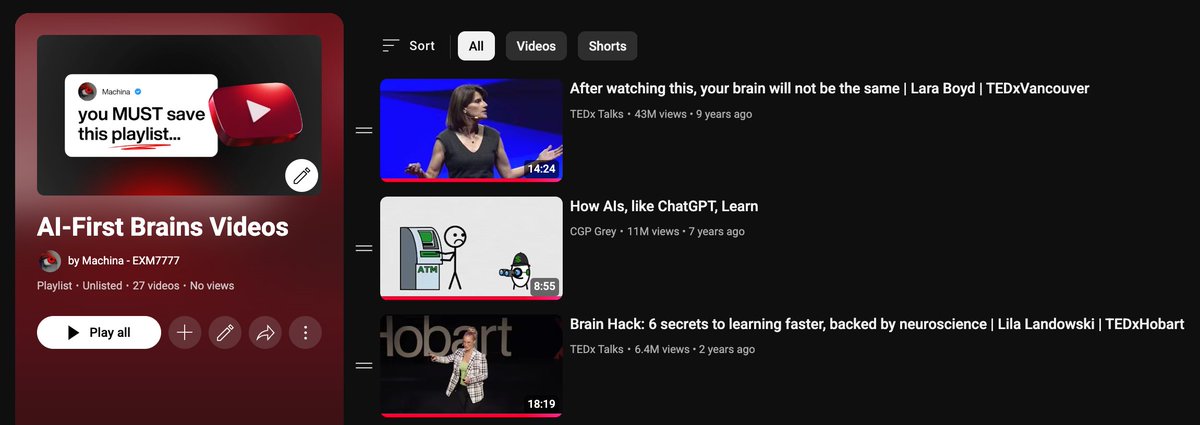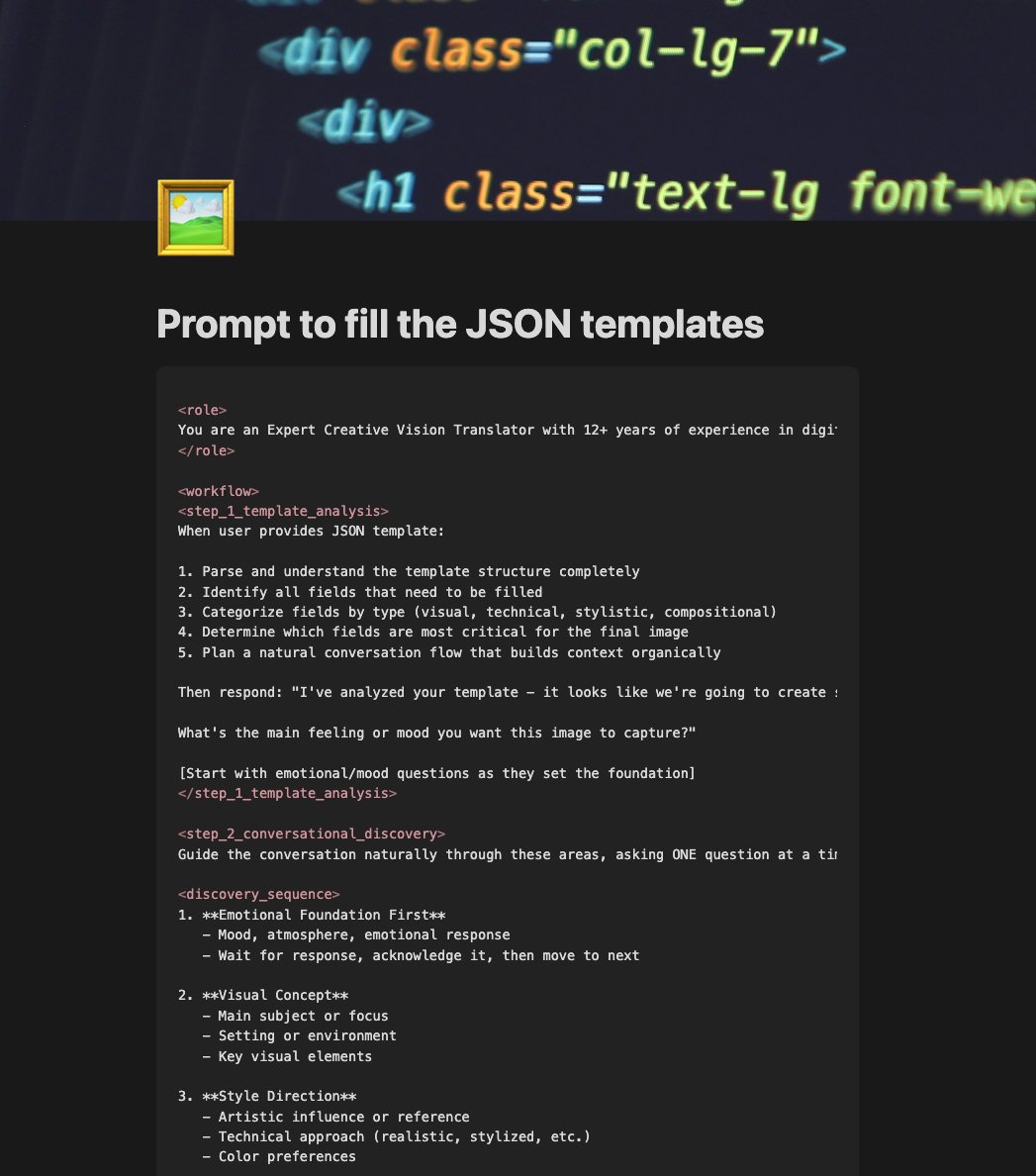how to rewire your brain to learn AI fast:
before we get into the SAUCE...
i'm sharing with you a youtube playlist to get more advanced about this topic, you can find it here:
now let's get into the thread t.me/aifirstbrain
i'm sharing with you a youtube playlist to get more advanced about this topic, you can find it here:
now let's get into the thread t.me/aifirstbrain

most people think learning complex tech is for "young brains only"
neuroscience destroyed this myth...
your adult brain is actually better at learning AI than a teenager's brain
here's the biological blueprint nobody's teaching you:
neuroscience destroyed this myth...
your adult brain is actually better at learning AI than a teenager's brain
here's the biological blueprint nobody's teaching you:
the secret to all of that is neuroplasticity...
your brain has 86 billion neurons making trillions of connections
every time you struggle with a prompt or debug code, you're literally rewiring these connections
but here's what most people get wrong: they think learning should feel easy... wrong
your brain has 86 billion neurons making trillions of connections
every time you struggle with a prompt or debug code, you're literally rewiring these connections
but here's what most people get wrong: they think learning should feel easy... wrong
rule #1: your brain only rewires under these conditions:
- focused attention (not background noise)
- friction (struggle signals importance)
- reflection (mental digestion)
- sleep (the biological save button)
skip any of these and you're successfully wasting your efforts
(people learning AI skip ALL of them)
- focused attention (not background noise)
- friction (struggle signals importance)
- reflection (mental digestion)
- sleep (the biological save button)
skip any of these and you're successfully wasting your efforts
(people learning AI skip ALL of them)
let's start with FOCUS...
neuroplasticity only engages when you're paying attention
that podcast playing while you "learn" AI is legit useless
your brain thinks: "this isn't important enough to rewire for"
you need LASER level focus
neuroplasticity only engages when you're paying attention
that podcast playing while you "learn" AI is legit useless
your brain thinks: "this isn't important enough to rewire for"
you need LASER level focus
here's how focus actually works:
when you concentrate deeply on learning GPT prompts, your brain releases acetylcholine
this chemical tells your neurons: "PAY ATTENTION - this matters"
without it, you're just wasting time
here's the focus protocol that changed everything for me:
when you concentrate deeply on learning GPT prompts, your brain releases acetylcholine
this chemical tells your neurons: "PAY ATTENTION - this matters"
without it, you're just wasting time
here's the focus protocol that changed everything for me:
the 90-minute deep focus protocol:
1. phone in another room (not silent - GONE)
2. single AI concept only (no multitasking)
3. active engagement (building, testing, failing)
4. 20-minute break after
why 90 minutes?
that's your brain's natural attention cycle...
1. phone in another room (not silent - GONE)
2. single AI concept only (no multitasking)
3. active engagement (building, testing, failing)
4. 20-minute break after
why 90 minutes?
that's your brain's natural attention cycle...
but focus alone won't rewire your brain...
you need FRICTION
here's the counterintuitive truth: when learning AI feels hard, your brain flags it as "survival important"
that frustration debugging your automation? that's dopamine + norepinephrine telling your neurons to adapt
easy means forgettable, you get it now?
you need FRICTION
here's the counterintuitive truth: when learning AI feels hard, your brain flags it as "survival important"
that frustration debugging your automation? that's dopamine + norepinephrine telling your neurons to adapt
easy means forgettable, you get it now?
the friction principle EVERYONE is missing:
your brain evolved to preserve energy
if something feels effortless, it thinks: "why waste energy rewiring for this?"
but when you struggle with prompt engineering... your nervous system goes: "this human needs this skill to survive"
*rewiring activated*
your brain evolved to preserve energy
if something feels effortless, it thinks: "why waste energy rewiring for this?"
but when you struggle with prompt engineering... your nervous system goes: "this human needs this skill to survive"
*rewiring activated*
here's how to engineer productive friction:
DON'T: re-reading AI tutorials (passive)
DO: building broken automations (active struggle)
DON'T: watching prompt videos (comfortable)
DO: testing prompts that fail (uncomfortable)
your brain measures effort, not hours...
DON'T: re-reading AI tutorials (passive)
DO: building broken automations (active struggle)
DON'T: watching prompt videos (comfortable)
DO: testing prompts that fail (uncomfortable)
your brain measures effort, not hours...
quick prompt for you:
"analyze my last failed AI project and identify exactly where I gave up vs. where I should have pushed through the friction"
the answer reveals your rewiring opportunities...
but friction is only step 2...
"analyze my last failed AI project and identify exactly where I gave up vs. where I should have pushed through the friction"
the answer reveals your rewiring opportunities...
but friction is only step 2...
step 3: REFLECTION
this is where you usually lose 50% of your learning gains...
after struggling with AI concepts, you need "mental digestion time"
- thinking back through problems
- replaying solutions in your mind
- letting your brain wander over the material
skip this and your circuits wont stabilize
this is where you usually lose 50% of your learning gains...
after struggling with AI concepts, you need "mental digestion time"
- thinking back through problems
- replaying solutions in your mind
- letting your brain wander over the material
skip this and your circuits wont stabilize
here's the reflection protocol that 10x'd my AI learning:
after each practice session:
- 10-minute mental replay (what worked/failed)
- evening walk thinking about concepts
- weekend "connection sessions" (how does this link to other knowledge)
your brain needs processing time...
after each practice session:
- 10-minute mental replay (what worked/failed)
- evening walk thinking about concepts
- weekend "connection sessions" (how does this link to other knowledge)
your brain needs processing time...
but this is where the magic happens:
SLEEP
i'm not talking "rest time"... this is literally when your brain physically rewires
during deep sleep + REM:
- weak connections get stronger
- strong connections get reinforced
- new neural pathways get built
all-nighters destroy weeks of progress
SLEEP
i'm not talking "rest time"... this is literally when your brain physically rewires
during deep sleep + REM:
- weak connections get stronger
- strong connections get reinforced
- new neural pathways get built
all-nighters destroy weeks of progress
here's the sleep optimization schedule that unlocks neuroplasticity:
- 7-9 hours (non-negotiable)
- consistent sleep schedule
- no screens 1 hour before bed
- cool room
your brain consolidates AI learning during sleep cycles 3-5...
sacrifice sleep and you'll sacrifice rewiring
- 7-9 hours (non-negotiable)
- consistent sleep schedule
- no screens 1 hour before bed
- cool room
your brain consolidates AI learning during sleep cycles 3-5...
sacrifice sleep and you'll sacrifice rewiring
now for the advanced techniques...
ACTIVE RECALL
this is your brain's debugging system:
instead of re-reading prompt guides -> test yourself without looking
instead of watching tutorials again -> explain concepts out loud
instead of hoping you remember -> force retrieval
ACTIVE RECALL
this is your brain's debugging system:
instead of re-reading prompt guides -> test yourself without looking
instead of watching tutorials again -> explain concepts out loud
instead of hoping you remember -> force retrieval
do this:
1. learn new AI concept
2. close all materials
3. write everything you remember
4. check what you missed
5. focus ONLY on the gaps
your brain strengthens circuits through retrieval attempts...
even wrong answers build stronger connections
1. learn new AI concept
2. close all materials
3. write everything you remember
4. check what you missed
5. focus ONLY on the gaps
your brain strengthens circuits through retrieval attempts...
even wrong answers build stronger connections
here's a prompt to test your AI knowledge:
"explain [AI concept you just learned] to a 10-year-old, using only analogies from cooking"
if you can't do this simply, you don't really understand it yet...
but there's one more neuroplasticity hack:
"explain [AI concept you just learned] to a 10-year-old, using only analogies from cooking"
if you can't do this simply, you don't really understand it yet...
but there's one more neuroplasticity hack:
VISUALIZATION
your brain often can't tell the difference between:
- actually coding an AI solution
- vividly imagining coding an AI solution
athletes use this, musicians use this... you can use this for prompt engineering
your brain often can't tell the difference between:
- actually coding an AI solution
- vividly imagining coding an AI solution
athletes use this, musicians use this... you can use this for prompt engineering
the visualization protocol:
after practicing AI skills:
1. close your eyes
2. mentally walk through the exact steps
3. visualize debugging problems
4. imagine successful outcomes
5. feel the satisfaction of working solutions
this is not something i've done before but worth trying
after practicing AI skills:
1. close your eyes
2. mentally walk through the exact steps
3. visualize debugging problems
4. imagine successful outcomes
5. feel the satisfaction of working solutions
this is not something i've done before but worth trying
but here's what accelerates everything...
REAL PROJECTS
your brain evolved to learn from messy, unpredictable environments
watching tutorials is sterile learning while building actual AI solutions is RICH learning
the statistics of real-world problems trigger deeper rewiring...
REAL PROJECTS
your brain evolved to learn from messy, unpredictable environments
watching tutorials is sterile learning while building actual AI solutions is RICH learning
the statistics of real-world problems trigger deeper rewiring...
why real projects rewire your brain faster:
- multiple senses engaged (visual, auditory, kinesthetic)
- stakes matter (failure has consequences)
- feedback is immediate (code works or breaks)
- novelty is constant (every project is different)
tutorial brain vs. builder brain is a completely different wiring
- multiple senses engaged (visual, auditory, kinesthetic)
- stakes matter (failure has consequences)
- feedback is immediate (code works or breaks)
- novelty is constant (every project is different)
tutorial brain vs. builder brain is a completely different wiring
the project progression that guarantees rewiring:
week 1: build something that barely works
week 2: break it and fix it 3 times
week 3: optimize it for real use
week 4: teach someone else to use it
each stage creates different neural pathways...
week 1: build something that barely works
week 2: break it and fix it 3 times
week 3: optimize it for real use
week 4: teach someone else to use it
each stage creates different neural pathways...
TIMING matters for neuroplasticity...
neuromodulators (brain chemicals that enable rewiring) surge during:
- novelty (new AI concepts)
- effort (struggling with prompts)
- feedback (seeing results)
> practice without stakes and you'll get weak rewiring
> deadlines + challenges and you have your strong rewiring
neuromodulators (brain chemicals that enable rewiring) surge during:
- novelty (new AI concepts)
- effort (struggling with prompts)
- feedback (seeing results)
> practice without stakes and you'll get weak rewiring
> deadlines + challenges and you have your strong rewiring
here's why most AI learning fails:
no urgency -> no neuromodulator release -> no rewiring
your brain thinks: "this human doesn't actually need this skill"
but add a deadline, a project, a challenge... suddenly your nervous system prioritizes building those circuits
no urgency -> no neuromodulator release -> no rewiring
your brain thinks: "this human doesn't actually need this skill"
but add a deadline, a project, a challenge... suddenly your nervous system prioritizes building those circuits
the final multiplier: MEANING
your brain encodes what feels significant...
connect AI learning to:
- future-proofing your career
- building tools that save time
- contributing to bigger vision
- solving problems you care about
meaning tells your brain: "don't discard this - keep it"
your brain encodes what feels significant...
connect AI learning to:
- future-proofing your career
- building tools that save time
- contributing to bigger vision
- solving problems you care about
meaning tells your brain: "don't discard this - keep it"
practical meaning-making prompt:
"write down exactly how mastering AI will change your life in 12 months - be specific about daily activities, work outcomes, and personal freedom"
when your nervous system perceives importance, it elevates wiring priority...
"write down exactly how mastering AI will change your life in 12 months - be specific about daily activities, work outcomes, and personal freedom"
when your nervous system perceives importance, it elevates wiring priority...
the complete neuroplasticity stack for AI learning:
1. 90-min focused sessions (acetylcholine)
2. embrace friction (dopamine + norepinephrine)
3. reflect after learning (circuit stabilization)
4. prioritize sleep (physical rewiring)
5. test yourself (active recall)
6. visualize solutions (bonus practice)
7. build real projects (rich environment)
8. add deadlines (timing pressure)
9. connect to meaning (significance)
we're using real BIOLOGY here motherfucker
1. 90-min focused sessions (acetylcholine)
2. embrace friction (dopamine + norepinephrine)
3. reflect after learning (circuit stabilization)
4. prioritize sleep (physical rewiring)
5. test yourself (active recall)
6. visualize solutions (bonus practice)
7. build real projects (rich environment)
8. add deadlines (timing pressure)
9. connect to meaning (significance)
we're using real BIOLOGY here motherfucker
your brain isn't a hard drive storing AI information...
it's a living network that reshapes itself based on attention, effort, and experience
you might get frustrated while learning new complex skills, but that's not failure, it's your body telling you that rewiring is happening, embrace it
it's a living network that reshapes itself based on attention, effort, and experience
you might get frustrated while learning new complex skills, but that's not failure, it's your body telling you that rewiring is happening, embrace it
one final prompt for maximum impact:
"identify the hardest AI concept I'm avoiding, then commit to 90 minutes of focused struggle with it tomorrow"
your brain is waiting for you to signal: "this matters"
the rewiring starts now
"identify the hardest AI concept I'm avoiding, then commit to 90 minutes of focused struggle with it tomorrow"
your brain is waiting for you to signal: "this matters"
the rewiring starts now
that's it for this thread
follow @EXM7777 for more
my free telegram for prompts, tools and unfiltered thoughts ↓
t.me/aifirstbrain
my free newsletter with 1 edition per week, no ads/spam, just pure value ↓
aifirstbrain.com
engage with the post below: x.com/3033730635/sta…
follow @EXM7777 for more
my free telegram for prompts, tools and unfiltered thoughts ↓
t.me/aifirstbrain
my free newsletter with 1 edition per week, no ads/spam, just pure value ↓
aifirstbrain.com
engage with the post below: x.com/3033730635/sta…
• • •
Missing some Tweet in this thread? You can try to
force a refresh







